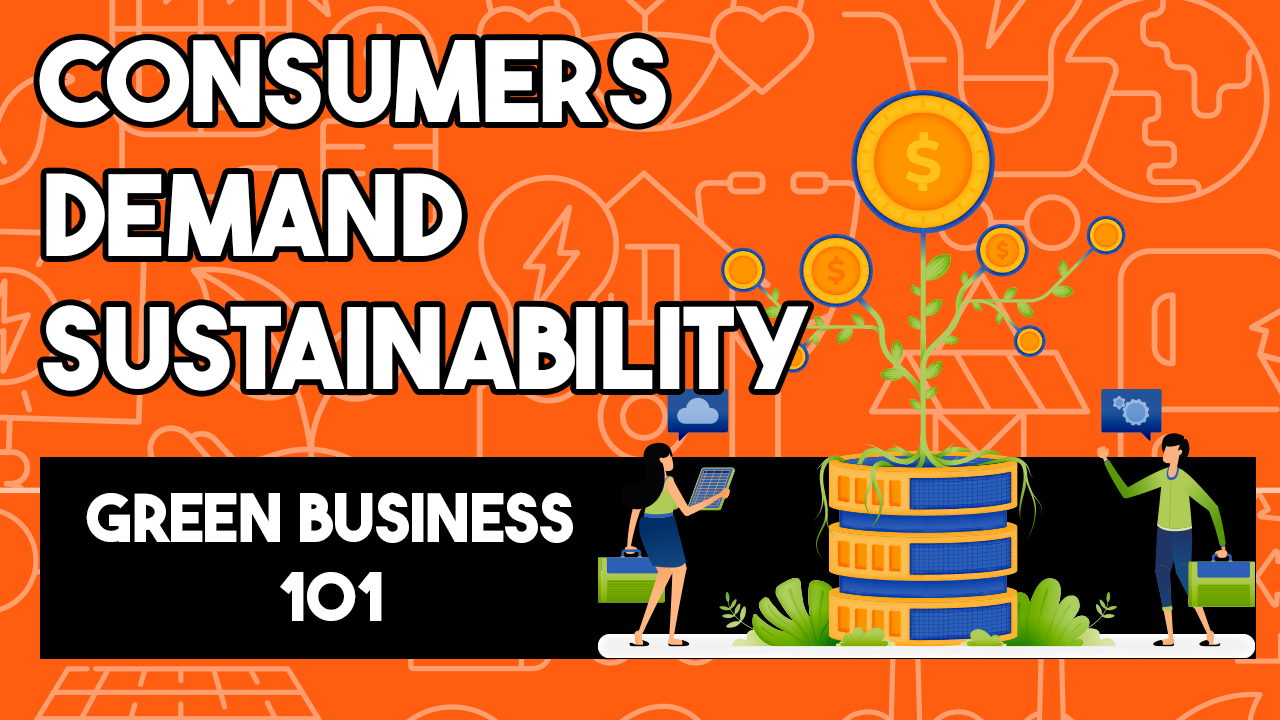
Are You Meeting Americans’ Demand for Sustainability? A Green Awakening
Jul 28, 2023 3 minutes
The contemporary landscape of the retail sector has experienced a transformative shift towards implementing sustainable business practices.
The environmental sustainability of a business owner extends beyond simply their carbon emissions or their energy use. It encapsulates the holistic approach they take towards their operations – from the supply chain to their waste management protocols.
This shift towards eco-friendly strategies is primarily due to two reasons:
1. The escalating concerns about climate change and the depletion of natural resources.
2. The growing awareness and demands of the conscious American consumer.
Retailers are increasingly recognizing that environmental protection isn’t merely about preserving the earth for future generations. In essence, sustainable practices also have a substantial positive impact on your bottom line.
By introducing renewable energy sources, reducing waste, and adopting energy-efficient operations, retailers can not only decrease costs but also enhance their reputation among stakeholders.
Harris Survey Reveals American Customer Expectations
The insights from this poll are particularly relevant as they uncover the motivations behind the customer’s decision to support environmentally conscious brands. Whether it’s reducing the carbon footprint and reliance on fossil fuels, minimizing the quantity of single-use plastic waste ending up in landfills, or supporting brands with strong corporate social responsibility initiatives, the survey presents a detailed picture of the evolving retail ecosystem.
Moreover, it emphasizes the importance of transparency and authenticity in sustainable marketing practices. As consumers become increasingly educated about environmental issues, they can distinguish between genuinely green businesses and those guilty of greenwashing. As a result, the accuracy of environmental claims is paramount, with repercussions for both the reputation of the retailer and the future of the planet.
The Current State of Sustainability in Retail
Consumer perception of sustainable retail presents an intriguing panorama of shifting expectations and nuanced opinions. It is evident that the American consciousness is rapidly aligning with the principles of environmental sustainability.
Many consumers are now making purchasing decisions, not just based on cost and quality, but also on the environmental impact of the product or service.
They are actively seeking brands that display commitment to sustainable practices, be it through renewable energy use, a transparent supply chain, or tangible steps to minimize greenhouse gas emissions.
However, one might argue that this consciousness has not been transformed into consistent action. While consumers might applaud sustainable initiatives, they are yet to translate this appreciation into a decisive boycott of non-sustainable retailers.
The Retail Industry’s Response to the Sustainability Demand
On one hand, you have industry leaders who are fully embracing sustainable business practices. They acknowledge the dual benefits of such an approach – the environmental and the economical. These businesses recognize that investing in energy-efficient systems and reducing energy use can not only lower their carbon footprint but also positively impact their bottom line.
Yet, on the other hand, it is apparent that the path to green business is fraught with challenges. For every retailer who has successfully integrated sustainable practices, there are others struggling with the practical implementation. The lack of universal, industry-wide standards is a significant hurdle.
Let’s not forget to consider the subset of retailers who are yet to prioritize sustainability. For them, the pursuit of short-term profit overshadows the long-term benefits of sustainability. They might argue that the future is unpredictable and the immediate focus should be on survival and growth.
The Challenges in Adopting Sustainable Shopping
Consumer demand for sustainability is on the rise, with two-thirds of Americans having purchased a sustainably made item at least once in the past year, according to the previously linked survey.
Despite this positive trend, there remain several hurdles that both consumers and retailers need to overcome to adopt sustainable shopping on a larger scale.
Cost
81% of Americans agree that sustainable goods are often more expensive, making it difficult to commit to such purchases when affordable alternatives are available. This price disparity arises from the high costs of sustainable sourcing, ethical labor practices, and environmentally friendly manufacturing processes.
Prioritization
The lack of prioritization of sustainable practices by retailers is another key challenge, with nearly three-quarters of Americans agreeing that it’s difficult to shop sustainably when retailers themselves do not prioritize such practices. This indicates a need for a shift in the retail industry’s approach, which includes integrating sustainability into their business models, from sourcing to distribution.
Transparency
Another obstacle is the complexity and lack of transparency in determining what constitutes a “sustainable” product. Over half of shoppers would not walk away from a retailer they discovered wasn’t operating sustainably, possibly indicating a lack of clear information about what makes a small business or product genuinely sustainable.
The Greenwashing Dilemma
Greenwashing, the practice of making misleading or unsubstantiated claims about the environmental benefits of a product, service, technology, or company practice, has become a significant issue in the retail industry.
As consumers’ interest in sustainability grows, many companies have capitalized on this trend by presenting themselves as environmentally friendly, regardless of the veracity of these claims.
From the consumer’s perspective, the prevalence of greenwashing presents a significant obstacle in making sustainable choices. Consumers are aware of and concerned about greenwashing in retail marketing. Despite their desire to shop sustainably, a lack of trust exists regarding a retailer’s sustainability claims about their recycling programs and waste practices, supply chain operations, and manufacturing practices.
This skepticism stems from the fact that greenwashing creates an environment where genuine sustainability incentives can be hard to distinguish from false claims. It’s a confusing landscape for consumers, where lack of transparency and standardized definitions of sustainability exacerbate the issue. This can lead to consumer apathy and disillusionment, undermining efforts to promote sustainable consumption. It also means that companies making genuine efforts towards sustainability can go unrecognized and unrewarded.
The Future of Sustainable Retail
As we progress further into the 21st century, sustainability is no longer an option but a necessity for retailers. The future of sustainable retail offers myriad opportunities for brands to align with consumer values, reduce environmental impact, and foster innovation.
The future of sustainable retail lies in addressing key issues that currently act as barriers to sustainable consumption. This includes the high cost of sustainable goods, the lack of trust in green claims, and the difficulty of shopping sustainably given the majority of retailers not prioritizing sustainable practices. The successful retailers of the future will be those that can address these challenges head-on.
This involves three major shifts:
1. Affordability and Accessibility: Retailers will need to find ways to make sustainable goods more affordable and accessible to a broader range of consumers. This could involve investing in technological innovations to reduce the costs of sustainable production (e.g., reuse packaging; compostable packaging), leveraging economies of scale, or advocating for policies that incentivize sustainable practices.
2. Transparency and Trust: The future of sustainable retail will also require greater transparency to build consumer trust. This might involve third-party certifications, greater disclosure of supply chain practices, or adopting blockchain technology to verify the origins and sustainability credentials of products.
3. Operational Sustainability: Beyond individual products, the future of sustainable retail will also focus on operational sustainability. This includes energy-efficient buildings, carbon-neutral delivery and logistics, and reducing waste across the supply chain. Brands that can effectively incorporate sustainability into every facet of their operations will be the leaders in this field.
The digital revolution will also play a pivotal role in sustainable retail’s future. Digital technologies like AI and IoT can help improve efficiency, reduce waste, and provide unprecedented levels of transparency. Retailers could, for instance, leverage AI to optimize stock levels and minimize overproduction, while IoT can enable real-time tracking of a product’s lifecycle, from manufacturing to delivery.
Is Your Business Green Enough to Sustain Consumer Growth?
The tides are undoubtedly turning in the retail industry, with sustainability evolving from a niche concern to a mainstream expectation.
While the road to sustainability is fraught with challenges, it is also paved with immense opportunities. By aligning their strategies with their customers’ environmental values, retailers can not only tap into a growing market but also contribute to a more sustainable and responsible global economy.
As more and more consumers realize the impact of their buying choices on the planet, the demand for transparency, authenticity, and real action will only increase. Therefore, retailers that are willing to invest in sustainable practices, communicate transparently with their consumers, and validate their claims through reliable verification methods will likely gain a significant competitive advantage in this evolving landscape.
Now, the question is whether your business is prepped for the green future? While DirectPayNet can help you stay compliant and protect your bottom line from things like chargebacks, we can also help you stay on top of best practices when it comes to marketing and sustainability.
Speak with us today about your business.




